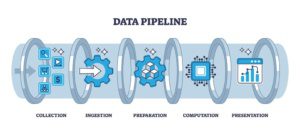Data Lakehouse
Streamline Data for
Next-Level Analytics with Data Lakes and Data Lakehouses


Data Lakes and Data Lakehouses play a pivotal role in modernizing businesses by offering a centralized repository for vast volumes and diverse types of data. They facilitate enhanced analytics, enabling organizations to derive valuable insights, foster innovation, and make informed, strategic decisions based on comprehensive and unified data sets.
How we Design and Implement Scalable Data Lakehouses
QX Impact empowers businesses by seamlessly integrating data from disparate sources and enabling advanced analytics.
Data Ingestion
We streamline your data journey - from any source to analysis-ready. We handle ingestion from on-premises, cloud, or streaming sources, and perform cleaning, and transformation to empower your insights.
Data Storage
We help you store your data efficiently while managing costs. Our expertise aids in selecting the ideal storage solution that aligns with your requirements and budget. Additionally, we safeguard of your data against unauthorized access and potential loss.
Data Processing
We empower you to process your data and extract valuable insights. We implement a variety of data processing tools and technologies like batch processing, stream processing, and machine learning.
Data Governance
We facilitate the implementation of data governance policies and procedures, guaranteeing the accuracy, reliability, and security of your data. Moreover, our expertise extends to aiding in compliance with data privacy regulations.
Data Analytics
Our seasoned teams of data scientists and analysts specialize in crafting and implementing personalized data analytics solutions. We provide support in interpreting your data analysis outcomes and applying these insights to drive your business forward.
Data Serving
We develop APIs that seamlessly deliver processed data to users and applications, including business intelligence (BI) tools, ML models, or real-time applications, for easy access, analysis, and integration, empowering you with real-time insights..
Why Choose QX Impact for Your Data Needs?


Customized Data Architecture


Scalable Infrastructure


Security and Compliance


Nimble Execution
Data Lakehouse – Insights and Resources
Delve into our curated resources to discover invaluable insights and tools for designing, deploying, and maintaining data lakehouses.
Ready to Transform Your Business?
Unlock the potential of your data with our Data Lakehouse Services. Get in touch with us today for a free consultation on how our data lakehouse solutions can help propel your data maturity.
Subscribe
Want to Stay Informed?
Get Our Latest Updates
FAQ
Commonly Asked Questions on Data Strategy
A Data Lakehouse is a unified data platform that combines the data science focus of a data lake with the end-user analytics of a data warehouse. The Lakehouse adds traditional data warehousing capabilities to existing data lakes, including ACID transactions, fine-grained data security, low-cost updates and deletes, SQL support, and BI-style reporting. By building on top of a data lake, the Lakehouse stores and manages all existing data in a data lake, including all varieties of data, such as text, audio and video, in addition to structured data in tables.
A well-defined data strategy provides clear guidance on the following elements:
- Data governance
- Data management practices,
- Data infrastructure, and
- Analytics capabilities.
Data warehouses are typically designed for structured data and follow a schema-on-write approach, while Data Lakehouses can handle both structured and unstructured data, following a schema-on-read approach. Data Lakehouses are nimble and cost-effective for modern data needs.
A Data Lake primarily serves as a storage repository for raw, unstructured, and semi-structured data. It follows a schema-on-read approach, meaning data is ingested without a predefined structure. In contrast, a Data Lakehouse combines the capabilities of a Data Lake with those of a Data Warehouse. It provides a structured, query-optimized layer on top of the raw data, enabling easier and more efficient data analysis.
- Flexibility: Data lakehouses can store and analyze all types of data, including structured, semi-structured, and unstructured data. This makes them ideal for a wide range of use cases, such as machine learning, data science, and business intelligence.
- Performance: Data lakehouses are designed to handle large datasets and complex queries efficiently. This makes them ideal for organizations that need to process and analyze their data quickly.
- Cost-effectiveness: Data lakehouses can help organizations to reduce their data storage costs by storing data in its native format. This eliminates the need to convert data to a different format before storing it in the data lakehouse.
- Governance: Data lakehouses offer a number of features that help organizations to govern their data, such as role-based access control, data encryption, and audit logging. This helps to ensure that data is secure and compliant with all relevant regulations.
To get started, you should assess your data needs, choose the right tools and technologies, design a data architecture, and plan a gradual migration or integration strategy. QX Impact’s experts can help you kickstart your Data Lakehouse journey.



